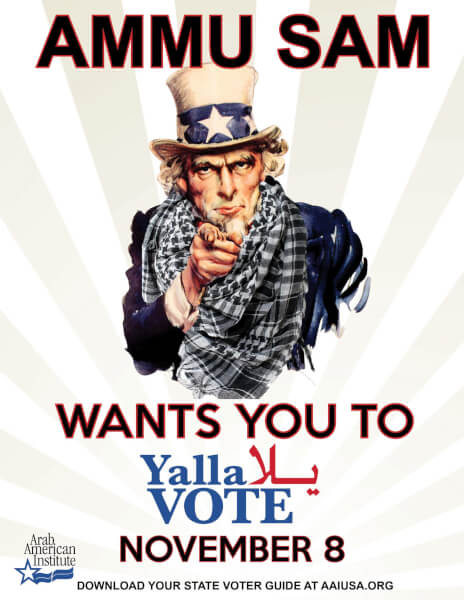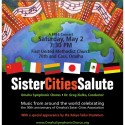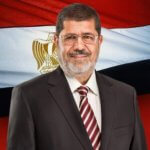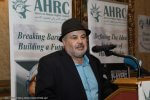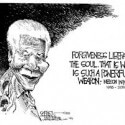Arab and Muslim Americans View the Race to the White House
Arab and Muslim American voters are not voting as a solid block because they are heterogenous ethnically, culturally, politically and socio-economically, even though they are culturally well integrated and emancipated, and politically involved and engaged.
By Abdennour Toumi

Muslim Americans are strongly leaning to vote for the Democrat candidate, Madam Secretary Hillary Clinton, as we go into the final hours before decision, according to CAIR (Council on American-Islamic Relations). The report presents a detailed picture of American Muslim voters, revealing their views on social issues and public policy.
The survey was conducted last month through a phone poll of 804 Muslim registered voters.
86% of Muslim voters are registered to vote in the U.S. presidential election this year. 12% of the voters have not decided for whom to vote in this election. However, 72% of voters said they would vote for Hillary Clinton, while 4% said they would vote for the Republican candidate Donald Trump. Three percent will vote for the Green party Dr. Jill Stein, and 2% will vote for the Libertarian candidate Governor Gary johnson.
44% of the Muslim voters consider themselves moderates, 25% are liberals, and 11% conservative.
Though the proportion of 67% is still holding, it shows their preference for the Democratic Party, up one point in comparison with the 2012 presidential elections. The numbers of the poll are demonstrating a clear element of sympathy toward the Democratic Party, hence its candidate in the race.
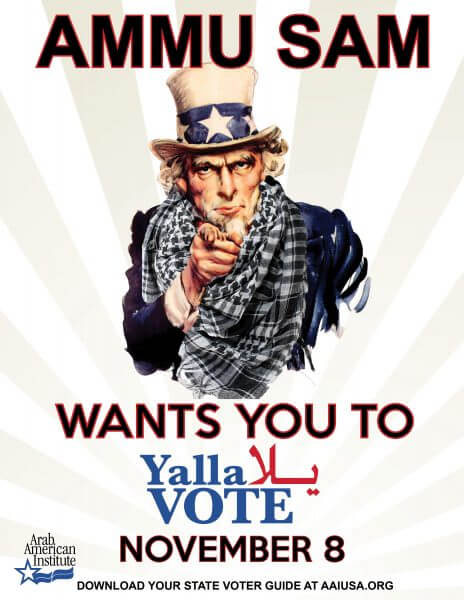
A growing concern regarding the “hate” speech and xenophobic acts in America has increased in light of the Republican party candidate’s anti-Muslim/Arab message in his populist campaign. Indeed, 77% of the CAIR interviewees found these issues to be increasingly worrisome and important to them.
Yet the Arab and Muslim American voters held a “prophetic” hope in President Obama’s election in 2008, after years of humiliation and scornful policies of the Bush administration’s MENA foreign policy. Later, President Obama approached the Arab and Muslim in America and in MENA region through appeasement and rapprochement in his famous rhetorical speech to them from the podium of the prestigious Cairo University.
In 2009, President Obama made a genuine overture toward the Muslims in the MENA region, giving the first interview to a foreign press to an Arab TV network, meeting the Saudi King cordially in the G-20 summit in London, then giving a speech before the Turkish parliament.
This decision to address the Muslims and Arabs was due to the high tension between the U.S. administration and the Arab/Muslim community in the U.S., the public opinion in the Middle East and North Africa, and the tumultuous relations since the tragedy of 9-11, followed by the U.S. invasion and occupation of Afghanistan and Iraq.
This is the first time that a U.S. President has lived in a Muslim country, worked with the Muslim community, has Muslim father and relatives, and a Muslim middle-name (Hussein).
Nonetheless, Muslims and Arabs thought President Obama’s Cairo speech would change the dynamic in the region, and things would not continue “business as usual” for the Arab and Muslim skeptics. But the elite, civil society activities and the political parties’ opposition were already manifesting their disappointment.
The Arab elite have interpreted this choice as an explicit endorsement of the continuity of the Egyptian regime. In consequence, the locals did not expect too much from the speech, which was Obamanian, eloquent, well-delivered, and not challenging.
This hoped for challenge was what the elite and youth have been looking for for decades.
A year later, the entire region rose up against the Arab tyrants, demanding liberty, dignity and equal opportunity for all, pushing those tyrants to leave and let them live free. During the first months of the so-called Arab Spring, MENA region saw a ray of hope, believing that the Baraka had come, making an end to “Joom-lookia,” a composed word of (joomhooria) or goomhooria in Egypt, republic and (moolkia) ownership.
It started in the most open country toward the West that has an old tradition of tolerance and openness vis-à-vis others. In Tunisia, a courageous young vegetable merchant sparked the Arab revolution of the decade, a real political and geopoliticalTunisiami.
Nonetheless, the point of President Obama’s speech at Cairo University and his policies in MENA have caused moral collateral damage and created troubled waters under a bridge that the majority of Muslim and Arab Americans and those in MENA have believed to pass through, a new policy based on mutual respect and understanding between America and its Muslims and Arabs and the people in MENA.
Muslim and Arab Americans are voting based on their own self-interest, even though the Democrat candidate, who was a hawkish voice in the U.S. Senate, does not hold positive legislative voting records related to MENA, as junior Senator of the state of New York. Later, as Secretary of State, Arab and Muslim analysts questioned her passive public diplomacy and policy towards the Arab uprisings.
Though, Arab and Muslims American voters are concerned about the education of their children, health care and the issue of terrorism as was stated in CAIR’s poll. They are not voting as a solid block because they are heterogenous ethnically, culturally, politically and socio-economically, even though they are culturally well integrated and emancipated, and politically involved and engaged.
This is why it’s difficult to believe that Muslim and Arab voters will have a direct impact on the election. In some swing states like Michigan and Virginia, they could help a favorable outcome for the Democratic candidate, but not much of a decisive say like the Latinos in Florida and Nevada.
As far as the race to the White house goes, Arab and Muslim voters are not that enthusiastic as shown in CAIR’s October poll of the American Muslim voters. Many of them, in particular the young, are disenchanted by President Obama’s MENA foreign policy, period. And a good margin is voting for the Green Party candidate ticket Dr. Jill Stein-Ajamu Baraka
After all, they are like the majority of their fellow Americans, not happy with the choices they’ve got.
So, two unpopular and polarized candidates, who have left the entire country divided more than ever: an anti-establishment candidate, who wants to end the American dynasty system of the Kennedys, the Bushes, and eventually the Clintons, and make America strong again. He did implode the Republican Party. On the other hand, a candidate, who wants to fight for the Americans — although she is fighting more for her political life.
The election of the 45th President of the United States is the closest one in decades, and Arab and Muslim voters really want the next American president to be strong and fight for all Americans and make America re-think its MENA foreign and defense policies.


- The Israeli-Palestinian Conflict: Is the Neither-Peace-nor-Security As-sumption Dominating Again? - June 7, 2021
- Algeria: “I Can See Clearly Now” - August 5, 2019
- Majesty Mohammed VI and General Gaïd Salah Tear Down This Wall! - July 29, 2019













